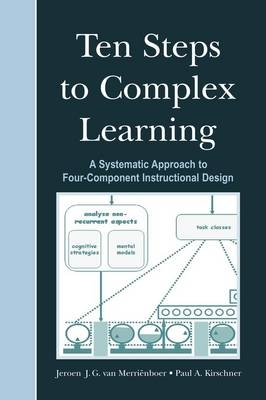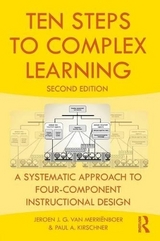
Ten Steps to Complex Learning
A Systematic Approach to Four-Component Instructional Design
Seiten
2007
Lawrence Erlbaum Associates Inc (Verlag)
978-0-8058-5793-1 (ISBN)
Lawrence Erlbaum Associates Inc (Verlag)
978-0-8058-5793-1 (ISBN)
- Titel erscheint in neuer Auflage
- Artikel merken
Zu diesem Artikel existiert eine Nachauflage
Presents in ten steps a path from a training problem to a training solution. This book helps practitioners, in the field of instructional design, to support their design of courses, materials, and environments for complex learning. It is useful to students, practitioners, (both instructional designers and teachers) and researchers.
Ten Steps to Complex Learning presents in ten steps a path from a training problem to a training solution in a way that students, practitioners, (both instructional designers and teachers) and researchers can understand and use.
Practitioners in the field of instructional design may use this book as a reference guide to support their design of courses, materials, and/or environments for complex learning. Students in the field of instructional design should use this book to broaden their knowledge of the design of training programs for complex learning.
Ten Steps to Complex Learning presents in ten steps a path from a training problem to a training solution in a way that students, practitioners, (both instructional designers and teachers) and researchers can understand and use.
Practitioners in the field of instructional design may use this book as a reference guide to support their design of courses, materials, and/or environments for complex learning. Students in the field of instructional design should use this book to broaden their knowledge of the design of training programs for complex learning.
Contents: Preface. A New Approach to Instruction. Four Blueprint Components. Ten Steps. Step 1: Design Learning Tasks. Step 2: Sequence Task Classes. Step 3: Set Performance Objectives. Step 4: Design Supportive Information. Step 5: Analyze Cognitive Strategies. Step 6: Analyze Mental Models. Step 7: Design Procedural Information. Step 8: Analyze Cognitive Rules. Step 9: Analyze Prerequisite Knowledge. Step 10: Design Part-Task Practice. Use of Media. Self-Directed Learning. Closing Remarks.
| Erscheint lt. Verlag | 30.8.2007 |
|---|---|
| Verlagsort | Mahwah |
| Sprache | englisch |
| Maße | 152 x 229 mm |
| Gewicht | 454 g |
| Themenwelt | Sozialwissenschaften ► Pädagogik |
| ISBN-10 | 0-8058-5793-1 / 0805857931 |
| ISBN-13 | 978-0-8058-5793-1 / 9780805857931 |
| Zustand | Neuware |
| Haben Sie eine Frage zum Produkt? |
Mehr entdecken
aus dem Bereich
aus dem Bereich
100 Kreative denken Lernen neu
Buch | Softcover (2023)
Franz Vahlen (Verlag)
CHF 82,55
Wissenschaftssprache in Regeln und Übungen
Buch | Softcover (2022)
UTB (Verlag)
CHF 20,95



